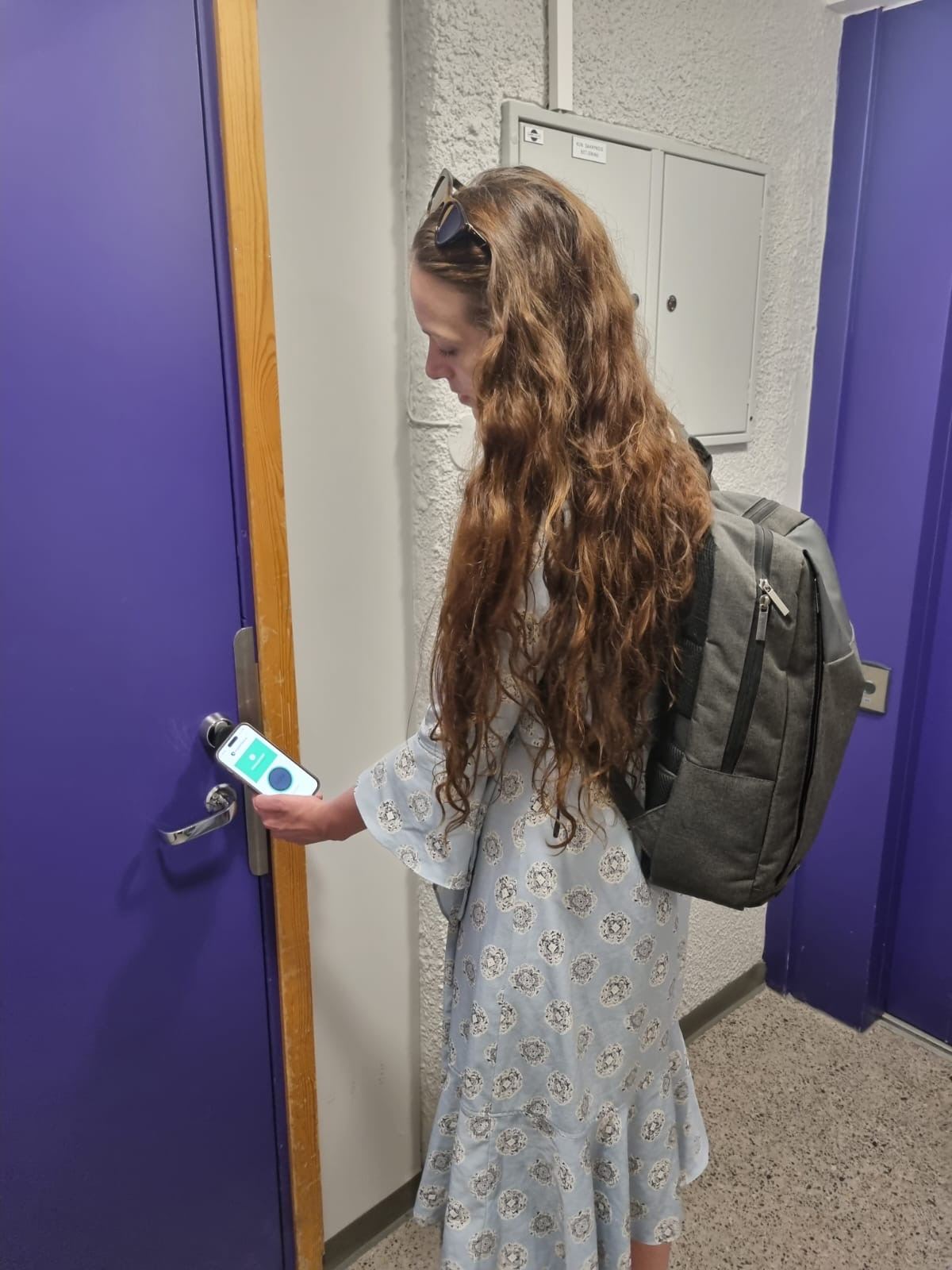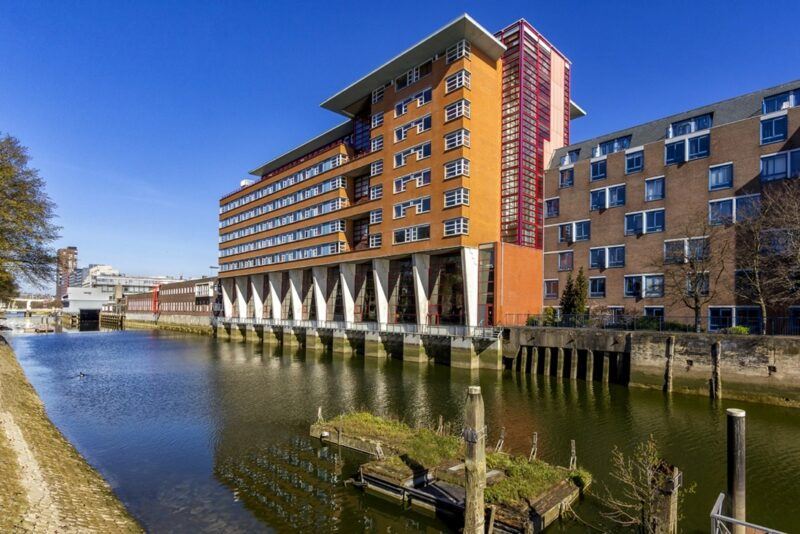
Anker STI
A seamless living experience for Oslo students
About the customer
The Anker Foundation’s (Anker STI) purpose is to own and manage the operation of residential facilities for apprentices and pupils at vocational schools and students at colleges and universities. The foundation also engages in hotel activities, and other activities aimed at making operations financially sound. Their portfolio includes a hotel, a hostel, an apartment building, a bunk-bed concept, business premises and 1800 student apartments spread over six locations in the city center of Oslo in Norway.
About the project
Being based in the city center, garbage bins reserved for residents were frequently used by unauthorized people. Anker wanted to find a good way to secure the bins so that only the residents could use them. At the same time, they were planning to update an old locking system used in about 500 apartments due to problems with delivering keys that were no longer being produced. Their first thought was to install the same battery-powered digital locks that had been installed in other properties ten years ago so that all apartments would be under one system. But those locks and the batteries in them had difficulties with Oslo’s cold winters, and the technical team had to spend a lot of time keeping them working. Therefore Anker was searching for an alternative.
The solution
Anker was in contact with a company regarding the issue with the garbage bins who told them about iLOQ. Impressed by iLOQ’s battery-free solution, Anker also discussed the possibility of using iLOQ with their student housing portfolio. As Anker was aiming to streamline the entire key management process to empower students to be more self-sufficient, iLOQ strongly recommended using the mobile locking solution alongside GuestCompass to create a good user experience for the student community.
Changing the locking system affects many parts of Anker’s organization; especially when switching from using physical keys, tags, or tokens to a mobile-key solution. In the past, decisions about the locking system were made by the finance, maintenance, and property management departments. When switching to mobile keys, operations also becomes important.
Anker visited a location in Amsterdam to see an example of this change in action. The location included buildings that were 300 years old, 50 years old, and only 3 months old, but all were equipped with iLOQ. This helped to convince Anker’s maintenance team and property management staff that this was a solid solution. They also got to chat with students who were happy and expressed that everything was working smoothly. This helped assure the housing administration that the solution was functioning well.
What made Anker decide on iLOQ and why in combination with GuestCompass?
What were the main benefits?
Digital locks that don’t need batteries aligned perfectly with Anker’s environmental goals. Plus, the easy setup and minimal maintenance made a compelling case for iLOQ’s solution.
GuestCompass specializes in access management for student housing, greatly enhancing iLOQ’s offering. Their solution includes unique features such as room-based access permissions, key sharing with neighbors, and specific usage guidelines tailored to different types of phones compatible with iLOQ. What sets GuestCompass apart from other door key apps is its complete customization to match Anker’s style, design, and brand. More importantly, it goes beyond just being a door key; the GuestCompass app serves as a comprehensive communication platform alongside the key function.
During Anker’s management meetings, they had numerous discussions on improving communication with students. Emailing, putting up paper notes on walls, and other initiatives were inefficient. The need for an ‘Anker’ app became evident.
The combination of iLOQ + GuestCompass – a key app alongside an ‘Anker’ app with communication features – solved the issue.
What challenges did Anker foresee in the transition to mobile keys for students?
Initially, sceptical thoughts arose when discussing mobile access with colleagues: “What if the battery dies, or if you misplace your phone? Is it secure? What about personal data usage?”.
Then, considerations about legal aspects and, of course, how the students will respond came into play. However, given the company’s recognition of the increasing mobile trend (even payment of rent and laundry is now managed through an app), they viewed these comments primarily as challenges they must address to progress.
How did Anker overcome the challenges?
GuestCompass presented a comprehensive project management plan for rolling out the mobile keys in Anker. The plan effectively coordinated all involved parties and emphasized communication, both internally and externally, regarding the transition to mobile access. This included various measures such as training sessions, posters, and a series of emails to align stakeholders and students.
GuestCompass demonstrated a clear understanding of the challenges ahead, including tough questions, technical hurdles, potential resistance, and user experience issues. They remained composed, hands-on, and readily available throughout the process, instilling confidence in Anker.
Upon GuestCompass’s suggestion, Anker even organized a pizza party to introduce the new system, which turned out to be a success, building a stronger connection with their tenants and making it a collaborative effort.
Per Friestad from iLOQ also provided compelling arguments for why they were making this transition and outlined its benefits, equipping Anker with responses to anticipated questions and aiding in staff training.
After more than a year, how has the implementation met Anker’s expectations
Both the software and hardware components have lived up to Anker’s expectations. Oslo’s cold winters posed significant challenges with Anker’s previous locking system, so they made the decision to expand iLOQ to another 200 apartments during the winter.
Additionally, there are some noteworthy additional benefits. Previously, Anker had high costs related to SMS messages. This cost has been reduced drastically since they started using push messaging on the GuestCompass app. GuestCompass also offers bike parking space rental on request, and now that it’s all digital, adding a digital key for users is incredibly easy.
Furthermore, Anker has extended the app’s use to the entire target audience, not just the 700 students with mobile keys. In the past, Anker relied on a customer service portal with emails and chat, but the app proves to be much more practical and efficient.
Anker’s journey with iLOQ and GuestCompass signifies a successful embrace of technology, ensuring a seamless living experience for their students in Oslo.
When I discovered that our Anker communication app was integrated with the digital key, everything fell into place. At last, we had an app that could reach all students with 100% coverage.





















